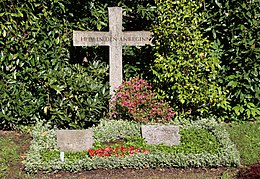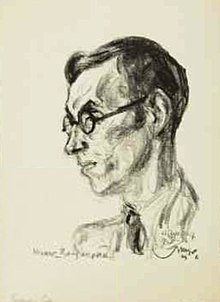fiction.wikisort.org - Writer
Werner Bergengruen (September 16, 1892 – September 4, 1964) was a Baltic German novelist and poet. He was nominated for the Nobel Prize in Literature.[1]

Werner Bergengruen | |
|---|---|
 Werner Bergengruen | |
| Born | 16 September 1892 Riga, Livonia, Russian Empire (Now Latvia) |
| Died | 4 September 1964 (aged 71) Baden-Baden, West Germany |
| Occupation | poet, novelist. |
| Nationality | German |
| Period | 20th century |
| Spouse | Charlotte Hensel |
Life and career
Bergengruen was born in Riga, Governorate of Livonia, which at that time belonged to the Russian Empire. After growing up in Lübeck and attending the Katharineum, he started studying theology in Marburg in 1911. He later changed to studying Germanistics and art history, but failed to graduate; he then moved to Munich. He served as a lieutenant during World War I and joined the Baltische Landeswehr in 1919 to fight against the Bolsheviks.
On 4 October 1919, he married Charlotte Hensel (1896–1990), a descendant of the composer Fanny Mendelssohn, and the daughter of the mathematician Kurt Hensel. From the marriage there were four children, Olaf, Luise, Maria and Alexander.
Bergengruen started writing novels and short stories in 1923 and decided to become a full-time writer in 1927. While his earlier works were of a more contemplative nature and pondered metaphysical and religious questions, the Nazis' rise to power led him to write more political works. His most successful novel, Der Großtyrann und das Gericht, published in 1935, is set in the Renaissance era, but the story of a merciless tyrant playing with the weaknesses of his underlings was often seen as a clear allegory on Germany's political situation. This interpretation is doubtful, though, as most of the novel was written before the Nazi takeover in 1933. In 1936 Bergengruen was received into the Catholic Church. The same year he moved to Munich; his new neighbour was Carl Muth, editor of the Catholic monthly Hochland. In 1937 he was expelled from the Reichsschrifttumskammer for being unfit to contribute to German culture. Although Bergengruen was politically a staunch conservative, his Catholicism—as well as the fact that his wife was of partly Jewish heritage—contributed to his alienation from the Nazi regime.
In 1942, after his house in Munich was destroyed by bombs, Bergengruen moved to Achenkirch. After World War II, he lived in Switzerland, Rome, and finally Baden-Baden, where he died in 1964.
Books
- "Rome remembered." (Transl. German: "Römisches Erinnerungsbuch") Introduced by Clare Boothe Luce. Translated by Roland Hill. 40 color plates by Erich Lessing; 57 engravings by G. B. Piranesi. New York: Herder and Herder, 1968 (ISBN 978-022-397663-4).
- "A Matter of Conscience." New York: Thames & Hudson, 1952. Review: Books: Morality Whodunit, TIME May 12, 1952 (ISBN 978-086-922740-4).
References
- "Nomination Database". www.nobelprize.org. Retrieved 2017-04-19.
На других языках
- [en] Werner Bergengruen
[fr] Werner Bergengruen
Werner Bergengruen (né le 16 septembre 1892 à Riga en gouvernement de Livonie et mort le 4 septembre 1964 à Baden-Baden) est un journaliste et romancier germano-balte. Politiquement conservateur, il n'avait aucune estime pour les politiciens nazis et finit par être censuré par le régime. Après 1945, il se rapprocha du catholicisme.[ru] Бергенгрюн, Вернер
Ве́рнер Бе́ргенгрюн (нем. Werner Bergengruen, полное имя — Ве́рнер Макс О́скар Па́уль Бе́ргенгрюн (нем. Werner Max Oskar Paul Bergengruen); 16 сентября 1892 (1892-09-16), Рига, Лифляндская губерния, Российская империя — 4 сентября 1964, Баден-Баден, ФРГ) — немецкий писатель-прозаик, поэт и переводчик.Другой контент может иметь иную лицензию. Перед использованием материалов сайта WikiSort.org внимательно изучите правила лицензирования конкретных элементов наполнения сайта.
WikiSort.org - проект по пересортировке и дополнению контента Википедии